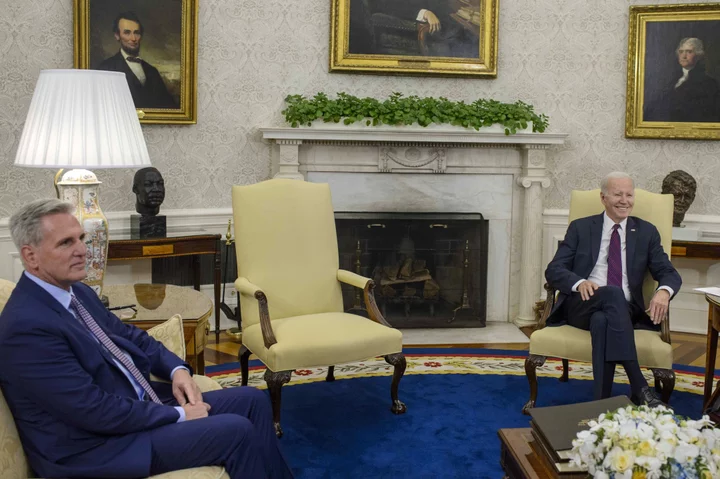President Joe Biden and congressional Republicans made little tangible progress Tuesday toward averting a first-ever US default, but pledged negotiations on spending that would open the door to a possible agreement.
Congressional aides and presidential staff will begin budget discussions in the coming hours, ahead of another meeting on Friday with Biden and congressional leaders, including House Speaker Kevin McCarthy.
“Over these last few days and weeks, there’s going to be a lot of posturing, politics and gamesmanship and it’s going to continue for a while,” Biden said after his hour-long meeting Tuesday in the Oval Office with leaders from both parties. But, the president said, he viewed the conversation as “productive.”
The intensified negotiations could at least temporarily assuage markets before June 1, when Treasury Secretary Janet Yellen has warned the nation risks exhausting its ability to meet all payment obligations. Economists say a breach of the debt ceiling would rattle markets, increase lending costs, and lead to the loss of hundreds of thousands of jobs.
Biden said he was pleased by Senate Republican leader Mitch McConnell’s comments after the meeting that he did not foresee the country defaulting. Senate Majority Leader Chuck Schumer also expressed hope of a bipartisan deal.
Still, warning signs continue to flash. McCarthy, who faces pressure from conservatives to take a hard line in debt-limit talks, told reporters he saw no progress during the meeting, and accused Biden of ducking substantive negotiations.
“I didn’t see any new movement,” McCarthy told reporters.
McCarthy and Biden described tense moments during the closed-door meeting, their first on the debt ceiling since Feb. 1.
Before Tuesday’s meeting, the speaker dismissed the idea of a short-term debt-limit extension, which could be the most expedient solution. While the White House said an interim deal was also not their plan, Biden told reporters after the meeting he isn’t taking anything off the table.
Biden also downplayed the possibility of using novel executive action to solve the issue. He said that he had considered invoking the 14th Amendment - which guarantees the validity of public debt - but was concerned that federal courts could overturn the maneuver. The president said he currently viewed the issue as something to explore after a debt ceiling deal was reached, rather than if it was not.
Biden also said his staff had not explored the idea for the Treasury Department to mint a trillion-dollar coin that it would deposit with the Federal Reserve to defuse the crisis.
Treasury futures were little changed as were their US equity counterparts after the meeting. While worries about the impasse have pushed Treasury-bill yields higher, concerns have yet to spill into broader markets with most investors banking on a deal being reached.
“I don’t think there is likely to be any market reaction until will get closer to the X-date — that is still a moving target, likely into June and quite possibly later into July,” said Jason Wong, currency strategist at Bank of New Zealand Ltd. “Meanwhile, headlines around negotiations are more noise than signal and mostly market-neutral.”
Yields on four-week Treasuries reached record highs last week as the prospect of any early June default increased. But so far equity markets have not registered a large drop attributable to the stand.
That marks a difference from the 2011 debt standoff, during which the S&P 500 fell more than 16% in the five weeks prior to an Aug. 2 increase in the ceiling. S&P ultimately downgraded the US credit rating on Aug. 5.
McCarthy said he was willing to discuss priorities that the White House had previously signaled support for — like permitting reform - that could provide a pathway for a possible breakthrough. The House bill has a version of permitting reform that favors fossil fuels. He also suggested elements of the House legislation, including clawing back funding for pandemic programs, that have some bipartisan support.
But Senate Majority Leader Chuck Schumer countered that McCarthy was holding the US economy hostage by demanding deep cuts to domestic programs - and had refused to take default off the table.
“There are large differences between the parties,” Schumer said.
But the the staff talks could open the door to a face-saving solution for both parties. The White House could call it a “separate” budget deal while McCarthy and the GOP, which has demanded deep domestic spending cuts in exchange for Republican votes, could tout it as a victory.
The Republican-led House last month passed a bill that would raise the debt ceiling by $1.5 trillion in exchange for $4.8 trillion in budget deficit cuts over 10 years. It contains a litany of conservative priorities, including canceling green energy subsidies and tax enforcement spending from Biden’s signature legislation enacted last year.
But the White House has criticized the legislation, saying it would slash funding for police, border security, and veterans’ benefits. McCarthy said the House will pass a detailed spending bill that increased funding for Veterans’ Affairs next week.
The White House has said it will only accept a “clean” no-strings-attached debt ceiling increase, although Biden is open to separate talks on the budget levels for fiscal 2024. The president is scheduled to travel Wednesday to New York, where he’ll criticize elements of the Republican legislation in the home district of moderate Republican congressman Mike Lawler.
--With assistance from Ruth Carson.
(Updates with permitting reform, in 16th paragraph.)

